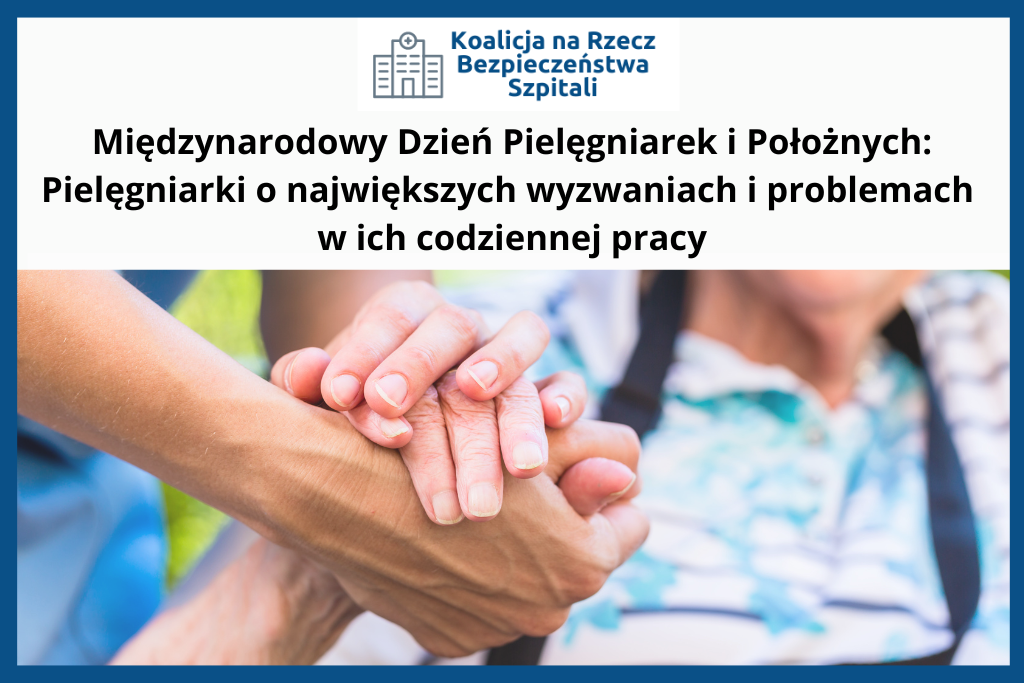International Nurses and Midwives Day was celebrated on 12 May to recognise the work of nurses and midwives and their dedication to ensuring patient safety. However, the work of nursing staff is not easy, with the average age of nurses in Poland exceeding 53 years and their lifespan shorter than that of the statistical woman[1], it is worth asking ourselves what are the challenges facing the work of nurses today?
Nurses and midwives live shorter lives than the rest of the population
Stress, adverse events, responsibility for human life, these are the daily challenges faced by nursing and midwifery staff. This profession also involves long working hours, often under fatigue and difficult conditions, which also results in risks to patient safety. As a consequence of the above problems, the statistical nurse lives a shorter life expectancy than the statistical Polish woman, where their average age at death is only 62.3 years (with the CSO pointing out that the median age of women who die according to the CSO is 81.8 years). In addition, the average age of nurses is over 53, and by 2030 as many as 65% current nurses and 60% midwives will be of pensionable age. This also means physical and mental fatigue, and working under constant stress can lead to professional burnout, illness or depression.
This problem has been highlighted by the nursing community including the Supreme Chamber of Nurses and Midwives for a long time.
"We have communicated for a long time about the problems related to the short life expectancy of nurses and midwives, all the time changes are needed to change the reality and comfort of their work. There is still a lack of generational replacement for a group of staff who have already reached retirement age. It should also be noted that nurses are often the first line of contact with the patient and are thus burdened with providing information to patients or their families or helping the patient himself, who is often lost when he arrives at the hospital." - comments Mariola Łodzinska, M.D., President of the Supreme Council of Nurses and Midwives and Expert of the Hospital Safety Coalition.
What can be done to make nurses live longer and be more comfortable?
By looking at the activities and working conditions of nursing staff, many lessons can be learnt to implement solutions to ensure safety and comfort.
Nursing staff are constantly exposed to occupational exposures and adverse events during contact with sharp needles, cannulas, scalpels or glass ampoules, among others. This problem is still under-reported, and one of the reasons is that workers often do not report injuries, being afraid or not having the time to do so. This is supported by research, proving that 40% of nursing staff did not report injuries and nearly 70% injured themselves up to 5 times during their work[2]. A solution to the above problem could be the purchase of safe equipment, training for staff or the introduction of injury records, but in electronic form, which would greatly speed up the data collection process. Another measure worth considering is the introduction of additional holidays to allow for rest, rehabilitation and full recovery of staff. In each facility, medical staff should also have access to a psychologist who can provide support, advice or simply listen to the staff member.
"For a nurse's job to be comfortable, it has to be safe. Dangerous incidents should not occur, but that is the risk that our job is fraught with. Safe equipment and regular training are elements that certainly make our job easier. It is also important that all procedures are followed, including meeting the employment standards of the healthcare provider. Another major problem is the overworking of nurses due to working in several healthcare providers. A nurse needs to be well rested to provide good medical care, this is currently a big problem that needs to be solved - Underlines Dr Anna Szczypta National Consultant in Epidemiological Nursing, Expert of the Hospital Safety Coalition.
Another important aspect is the approach and attitude of the patients to the medical staff themselves; by being friendly and understanding, you can also ensure a comfortable and stress-free working atmosphere for the nurses. It is also worth taking care of the organisation of work itself in hospitals; a large role is played here by the directors and managers of the facilities, who should react on an ongoing basis to all problems that the nursing staff may encounter, as well as introduce new solutions that will improve the work of the medics.
"It should not be forgotten how big a role in the comfort and convenience of the medical staff is played by the people who manage a medical facility. These are the people on whom the most basic, day-to-day issues related to the needs of the nursing staff depend. It is increasingly common for facilities to be managed by nurses who know the needs and requirements of staff best." –adds Jolanta Korczyńska, M.Sc. - President of the Polish Association of Epidemiological Nurses, Expert of the Coalition for Hospital Safety.
[1] Report of the Supreme Council of Nurses and Midwives - "Nurse, Midwife - Deficit Occupations in the Polish Health Care System".
[2] Study "Implementation of Council Directive 2010/32/EU in Polish hospitals".

